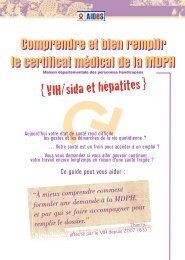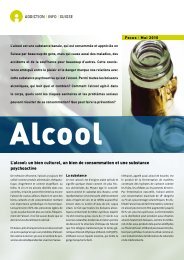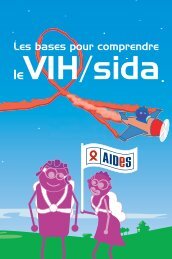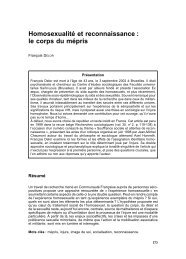Care and support for people living with HIV/AIDS
Care and support for people living with HIV/AIDS
Care and support for people living with HIV/AIDS
Create successful ePaper yourself
Turn your PDF publications into a flip-book with our unique Google optimized e-Paper software.
Report on the global <strong>HIV</strong>/<strong>AIDS</strong> epidemic – June 2000old, <strong>and</strong> 70% are unmarried. Most callers have had a high-school or university education.Less than 20% are women. The Hotline is advertised on bulletin boards,trains, metros, buses <strong>and</strong> in Arabic-language newspapers. Although the project originallyfocused on Greater Cairo, <strong>people</strong> call in from rural settings <strong>and</strong> from othercountries where these newspapers are read.Between September 1996 <strong>and</strong> May 1998, 18 628 calls were made, averaging nearly1000 per month – a number that has surpassed all expectations. The anonymity ofthe Hotline appears to have provided a vital link to in<strong>for</strong>mation <strong>and</strong> counselling servicesthat would not otherwise have been accessible. Through the Hotline, <strong>people</strong> c<strong>and</strong>iscuss issues such as sexuality, condom use, premarital sex <strong>and</strong> homosexuality,which are rarely addressed in public <strong>for</strong>ums. At the time of its evaluation, this wasthe only hotline run by a government service in the Middle East <strong>and</strong> given enoughresources to function effectively.The right to in<strong>for</strong>mation about <strong>HIV</strong> transmission <strong>and</strong> prevention has sometimes beendenied to young <strong>people</strong> on the grounds that they are – or should be – sexually abstinent(the reality of young <strong>people</strong>’s sexuality is far more complex than this, however –see pages 56-59). In some places, there<strong>for</strong>e, young <strong>people</strong> are more vulnerable thantheir elders because they are less likely to know enough about <strong>HIV</strong> to protect themselves.An international programme of demographic <strong>and</strong> health surveys permits acomparison of knowledge about <strong>HIV</strong> among teenagers in several countries. Figure 14shows the proportion of teenagers who do not know how to protect themselvesagainst <strong>HIV</strong>. Either they have never heard of <strong>AIDS</strong> or they think nothing can be doneto avoid the virus, or they think it is not inevitable but cannot name a way of avoidingit. In four countries where the adult <strong>HIV</strong> prevalence rate is over 10%, a fifth or moreof girls in their late teens know too little about the virus to protect themselves. Boysconsistently have more knowledge than girls, <strong>and</strong> this may be one reason why theyhave lower <strong>HIV</strong> rates (see pages 9-10 <strong>and</strong> 48).Lack of education: a growing liabilityIn general, <strong>people</strong> <strong>with</strong> more education lead healthier, more productive lives. Thereare several reasons <strong>for</strong> this association: better-educated <strong>people</strong> generally havegreater access to in<strong>for</strong>mation than those who are illiterate or uneducated, <strong>and</strong> theyare more likely to make well-in<strong>for</strong>med decisions <strong>and</strong> act on that in<strong>for</strong>mation. In addition,educated <strong>people</strong> generally have better jobs <strong>and</strong> greater access to money <strong>and</strong>other resources which can help them <strong>support</strong> healthier lives. These same resourcescan, however, be used to buy alcohol, drugs <strong>and</strong> sex, to move to urban areas wherebetter jobs are available but <strong>HIV</strong> infection rates are high, <strong>and</strong> to otherwise encouragebehaviours that increase the risk of becoming infected. When it comes to protectionagainst <strong>HIV</strong>, is education really an asset?42











